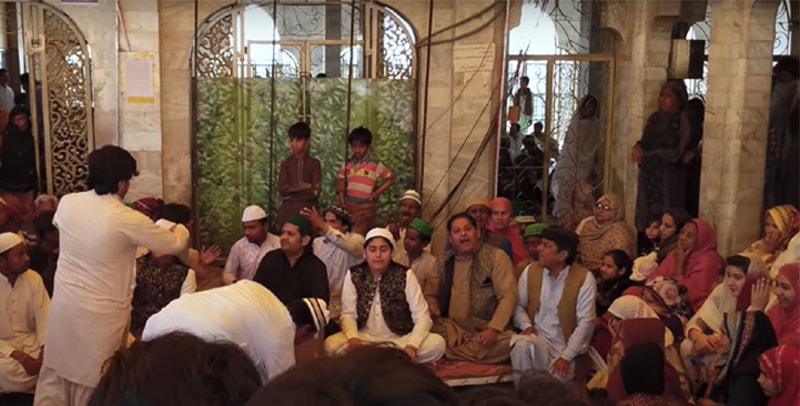
There are some songs that reach straight into the core of your being and turn you inside out. Umair Jaswal’s deeply evocative, hauntingly beautiful Rabba, is one of those.
The story being told here is as old as time itself and yet still relevant — he is reaching out to a higher power, desperately seeking answers to the meaning of his life and in return, his salvation.
It’s hard not to be moved, whether or not you fully understand the lyrics in Punjabi — the plaintive chorus that calls out to the Divine is easily understood on a visceral level. The song was released as one of the singles from Jaswal’s recently-concluded, breathtakingly beautiful travel series, EasyPaisa Raahi, which he wrote and produced as well.
The orchestral treatment of the song, coupled with a haunting rendition of the choir singing a part of the main chorus, Hor vi neevan ho [Bow your head even further down (in humility)] give Rabba its larger-than-life feel. Hor vi neevan ho is a line from the kaafi of one of Punjab’s most revered Sufi poets, Shah Hussain. The other part of the chorus is where he asks God, using various names attributed to him, to reveal himself to Umair — Aaa vas dil wich kadi [Come dwell in my heart sometime].
The profoundly poignant Rabba marks Umair Jaswal’s evolution from an imitative rock persona to an artist willing to bare his soul
This is an especially difficult song to translate. I reached out to several people and received long, enthusiastic explanations of the song’s ‘overall’ meaning, but no literal translations. One songwriter even said it would be impossible because translating verbatim it would change the deeply spiritual meaning of the song — like the best music it has to be felt.

Nevertheless, the main thrust of the song is about an elusive search for inner peace. Jaswal sings: “Vikhda naee / Disda naee / Kyun mann vich wasda naee / Agg laundi maar mukaoundi / Nach nach tainu manaoundi / Bol te saee / Bolda naee / Kan ras ghol te saee / Akhaan ro ro thak chaliyaan / Labdawaan haq galiyaan [I can’t see it / Can’t find it / Why can’t I feel it? / I set myself on fire, in this agony / I danced to make you happy/ Speak up / You are silent / Whisper some sweetness into my ears / My eyes are sore from crying / I seek consolation (or truth) all around].” At the end, Jaswal is literally begging for some great revelation: “Ronda tera banda / Aa vi jaa / Kamla labda phirda / Aa vi jaa [This man is crying out / Reveal yourself / He wanders like a madman / Reveal yourself].”
“This song was originally a part of Umair’s own album,” says Sarmad Ghafoor, the producer of the song. “We recorded it almost three years ago. The original version had Zain Peerzada and Ali Sohail on electric guitar, Essa Najam and Sameer Shami on bass guitar, Aamir Azhar on acoustic guitar and mandolin and Hasan Badshah on the flute.”

Which such an impressive line-up, why didn’t they just use the original version? “It was pretty heavy — rock heavy,” responds Sarmad. “It had distorted guitars etc. They then came up with an acoustic version of the song.”
Why didn’t they go for that? “We were trying the acoustic version for the episode but it wasn’t working,” says Sarmad. “It was too intimate. It didn’t sound big, cinematic. The only way I could do that was by giving it an orchestral sound and a grand feel that went with the visuals.

“I came up with my own parts, piano and percussion programming and used some of their parts and mostly ‘orchestrated’ it [musically] for the episode. This is the third version of song,” he laughs. In fact, the keyboard-strings orchestration provides the song one of its strongest and easily identifiable trailing riffs. The choir effect in the part ‘Hor vi neevaan ho’ was done using Umair, Sarmad and Sarmad’s wife, Shandana’s vocals. The thought put into the song and the effort has clearly paid off.
It was also insightful to reject whatever the original ‘rock’ version was. This was a song that needed soaring strings, clean orchestration and the emotional bite it now has. Jaswal has for too long limited himself, trying to fit into some sort of pale imitative archetype of the metalhead/rocker persona. Hopefully, the response to this song will allow him to see that sincere, emotive singing is more powerful than any preconceived notions of pop persona. Personally, I can’t wait for this song to be rendered with a live strings section rather than the current electronically programmed one.

Umair Jaswal went on a journey across the country to seek answers that had to come from within. In Rabba we get the full force of his anguish and torment in all of its heart-breaking beauty. It remains to be seen whether he found the answers he was looking for.
Published in Dawn, ICON, October 4th, 2020
















































